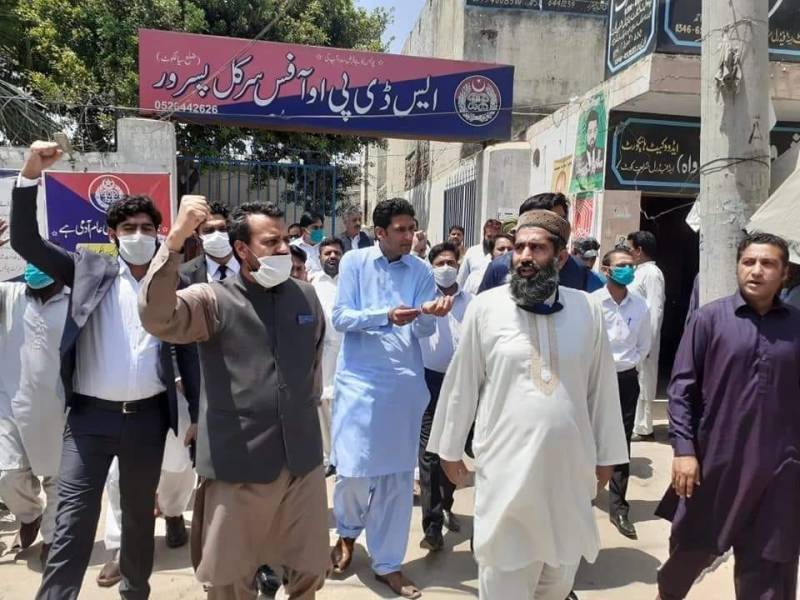
A mob of extremists from Tehreek-e-Labbaik Pakistan (TLP) and Sunni Tehreek violated the regulations of social distancing in Sialkot to protest against a football maker whom they accused of blasphemy for allegedly placing the images of the Holy Quran on footballs.
The police then registered a blasphemy case against the accused football maker under Maintenance of Public Order Ordinance, but the clerics want this case registered under Section 295-C (that includes the death penalty).
https://twitter.com/SAMRIReports/status/1255991716382900226?s=20
South Asian Media Research Institute tweeted that Yamin Madni, worker of an extremist organisation said that they shall defend the Prophet (PBUH)'s honor till last drop of their blood and demanded that the factory owner who made blasphemous footballs should be severely punished otherwise they will hold nation-wide protests.
Lawyers in Pasrur defy social distancing guidelines amid Covid-19 pandemic to hold a rally calling for prosecuting the factory owner, who made blasphemous footballs, under Section 295-C (that mandates death penalty).
Mian Rizwan, leader of extremist outfit Sunni Tehrik, defied the guidelines as he led a rally towards DSP Pasroor protest against local police officer who refused to register the case against a blasphemer football, chanting hateful slogans against the Ahmadi community.
In Pakistan, during the 1980s the blasphemy laws were created and expanded in several installments. In 1980, making derogatory remarks against Islamic personages was made an offence, carrying a maximum punishment of three years in jail.
In 1982, another clause prescribed life imprisonment for "willful" desecration of the holy book, Quran. In 1986, a separate clause was inserted to punish blasphemy against the Prophet Muhammad and the penalty recommended was "death, or imprisonment for life", in that order.
The police then registered a blasphemy case against the accused football maker under Maintenance of Public Order Ordinance, but the clerics want this case registered under Section 295-C (that includes the death penalty).
https://twitter.com/SAMRIReports/status/1255991716382900226?s=20
South Asian Media Research Institute tweeted that Yamin Madni, worker of an extremist organisation said that they shall defend the Prophet (PBUH)'s honor till last drop of their blood and demanded that the factory owner who made blasphemous footballs should be severely punished otherwise they will hold nation-wide protests.
Lawyers in Pasrur defy social distancing guidelines amid Covid-19 pandemic to hold a rally calling for prosecuting the factory owner, who made blasphemous footballs, under Section 295-C (that mandates death penalty).
Mian Rizwan, leader of extremist outfit Sunni Tehrik, defied the guidelines as he led a rally towards DSP Pasroor protest against local police officer who refused to register the case against a blasphemer football, chanting hateful slogans against the Ahmadi community.
After the charged protests by the extremist outfits, police registered blasphemy case, under Section 295-C (that mandates death penalty), against the football maker.
In Pakistan, during the 1980s the blasphemy laws were created and expanded in several installments. In 1980, making derogatory remarks against Islamic personages was made an offence, carrying a maximum punishment of three years in jail.
In 1982, another clause prescribed life imprisonment for "willful" desecration of the holy book, Quran. In 1986, a separate clause was inserted to punish blasphemy against the Prophet Muhammad and the penalty recommended was "death, or imprisonment for life", in that order.
